The National Student Speech-Language Hearing Association at California State University, Los Angeles is an active chapter of NSSLHA. This space is reserved for notices on upcoming meetings and events, discussions related to our field and communication with our members. The content is not necessarily the views of California State University, Los Angeles (CSULA), National Student Speech Language Hearing Association (NSSLHA) or the American Speech Language Hearing Association (ASHA).
Wednesday, April 26, 2006
Next NSSLHA meeting on May 22, 2006 in KH B-111 @ 6:20 P.M.
Please note that rather than meeting on the first Monday of the month (as usual), we are holding a special End-of-the-Spring-Quarter meeting!
Stay tuned for more news on what specialties we will feature at the next meeting, on May 22, 2006!
Good luck with midterms and congrats to the future first-year graduate students on their decisions for this Fall!
Sunday, April 09, 2006
Team NSSLHA @ the MS Walk
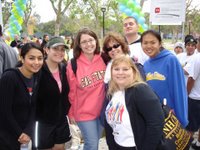 After months of preparation, fundraising, and anticipation, Team NSSLHA at Cal State LA represented at the National Multiple Sclerosis Walk! This fantastic team raised $2,222.00!
After months of preparation, fundraising, and anticipation, Team NSSLHA at Cal State LA represented at the National Multiple Sclerosis Walk! This fantastic team raised $2,222.00!Although the MS Walk was set to begin at 9 AM, walkers actually officially began at 8:45 AM. At 8:47 AM, half of Team NSSLHA was already separated from the other half.* Oops! That wasn't because they were racing to the Finish Line to be first in line for Louise's Trattoria...that was because the walk was supposed to start at 9 and some of us really wanted our free chocolate protein bar, bottled water, and fruit!
*The unlost half is represented in this picture. The gentleman in back is NSSLHA Vice-President's significant other, not a random picture-crasher.
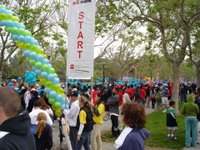 See NSSLHA Treasurer in the blue? She is looking out for her lost team members. What a sport! She helped reunite the team. Phew!
See NSSLHA Treasurer in the blue? She is looking out for her lost team members. What a sport! She helped reunite the team. Phew! Hundreds of volunteers and corporate sponsors supported the thousands of walkers. With so many people walking, there was no way we could have sprinted if we wanted to! Instead, we leisurely strolled past the LA Memorial Coliseum, tyco drummers, Exposition Park, many babies in strollers, the Natural History Museum, groups of volunteers with cookies, water, and fruit, and the California Science Center. Team NSSLHA is proud to say that even though we strolled around and through USC, we did not cut corners! We walked every bit of the 5K route. :)
Hundreds of volunteers and corporate sponsors supported the thousands of walkers. With so many people walking, there was no way we could have sprinted if we wanted to! Instead, we leisurely strolled past the LA Memorial Coliseum, tyco drummers, Exposition Park, many babies in strollers, the Natural History Museum, groups of volunteers with cookies, water, and fruit, and the California Science Center. Team NSSLHA is proud to say that even though we strolled around and through USC, we did not cut corners! We walked every bit of the 5K route. :)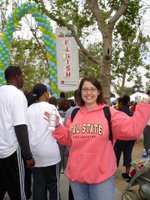 Some of us (i.e., our awesome Team NSSLHA Co-Captain who doubles as our NSSLHA Newsletter editor)* were so excited to see the Finish Line (not because it was such a long walk, but because we felt a great sense of accomplishment) that we started taking pictures when we saw the Finish Line. The other Co-Captain commented, "Um, shouldn't we actually cross the Finish Line?"
Some of us (i.e., our awesome Team NSSLHA Co-Captain who doubles as our NSSLHA Newsletter editor)* were so excited to see the Finish Line (not because it was such a long walk, but because we felt a great sense of accomplishment) that we started taking pictures when we saw the Finish Line. The other Co-Captain commented, "Um, shouldn't we actually cross the Finish Line?"*She was not the only one. She just happened to be singled out because we love her so much. :)
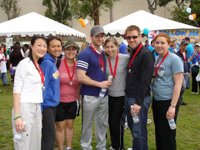 So we did and kiddo volunteers awarded each walker with medals! We are truly winners!*
So we did and kiddo volunteers awarded each walker with medals! We are truly winners!**Sans NSSLHA President and a loyal NSSLHA member, this is a picture of the lost-for-a-few minutes half.
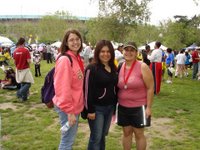 What a success Team NSSLHA was!
What a success Team NSSLHA was!Next year, we hope you will join us when we are even more prepared with matching bunny ears or shirts, balloons, NSSLHA signs along the route, and an airplane banner message to cheer us on.
Okay, we're slightly kidding about the latter, but definitely serious about the former.
Thanks again to all participants and donors for truly helping the National Multiple Sclerosis Society fight and find a cure.
Tuesday, April 04, 2006
NSSLHA presents Marilyn Van Dyke, SLP & Mother of Child with Asperger's
In honor of April being Autism Awareness Month, NSSLHA invited Marilyn Van Dyke to speak at yesterday’s meeting. Van Dyke is a speech-language pathologist, CSULA Special Education professor, and mother of a 15 year-old teenager with Asperger’s Syndrome. As if that weren’t enough to keep her busy, she is also currently pursuing her Doctorate’s Degree in Special Education through a joint UCLA and CSULA program.
ø¤º°`°º¤ø,¸¸,ø¤º°`°º¤ø,¸¸,ø¤º°°º¤ø,¸¸,ø¤º°`°º¤ø
Both autism and Asperger’s are classified under Pervasive Developmental Disorder (PDD). Oftentimes, Asperger’s is considered a mild form of autism or Autistic Spectrum Disorder (ASD). A key characteristic of Asperger’s is that the individual generally communicates different to the accepted norm. People with Asperger’s generally lack understanding of social customs and will “freely speak their mind.”
For the Van Dykes, parenting a child with Asperger’s was almost like reliving their youth. Both parents began informal treatment early on with getting their son extremely involved with peers on a regular basis. They knew that peer interaction was key to helping him improve his social skills (pragmatics!). When their son was younger, the Van Dykes would fearlessly bring him to regular outings and birthday parties to engage him in any activity that would facilitate social interactions and friendships. As kid Son grew older, Mom and Dad got “hip” with the times and learned (and played) Pokemon cards and video games with their Son to help him “fit in with the crowd.” As kid Son matured into a young teenager, Mom and Dad found themselves learning about text messaging and even going to rap concerts for their Son’s sake. Pursuing these interests gave their Son a way to engage in successful social interactions with peers.
ø¤º°`°º¤ø,¸¸,ø¤º°`°º¤ø,¸¸,ø¤º°
Future Dr. Van Dyke also gave a brief breakdown of autism. According to the Diagnostic and Statistical Manual of Mental Disorders - Fourth Edition (DSM-IV), the three diagnostic criteria for autism are:
- Impairments in social interactions. In particular, eye-gaze, reciprocity, and joint attention are key characteristics to note. At as early as a few months old, researchers have noted how “different” babies with autism interact. “Even as a baby, holding and feeding is not the same at as young as 6 months,” commented Van Dyke. “It is the impairment in this particular area that distinguishes [autism] from other disorders.”
- Impairments in communication. “This is the true back and forth, or pragmatics. It is the social use of language.” Van Dyke noted that those who are high-functioning will still have impairments in communication, such as understanding emotions.
- Restricted or repetitive range of interests. People with autism can have an extremely narrow range of interests. For Van Dyke’s son, numbers were his main interest. Anything with numbers would captivate him (e.g., basketball scores).
We thank Marilyn Van Dyke for sharing her expertise as well as personal experience with regards to autism.